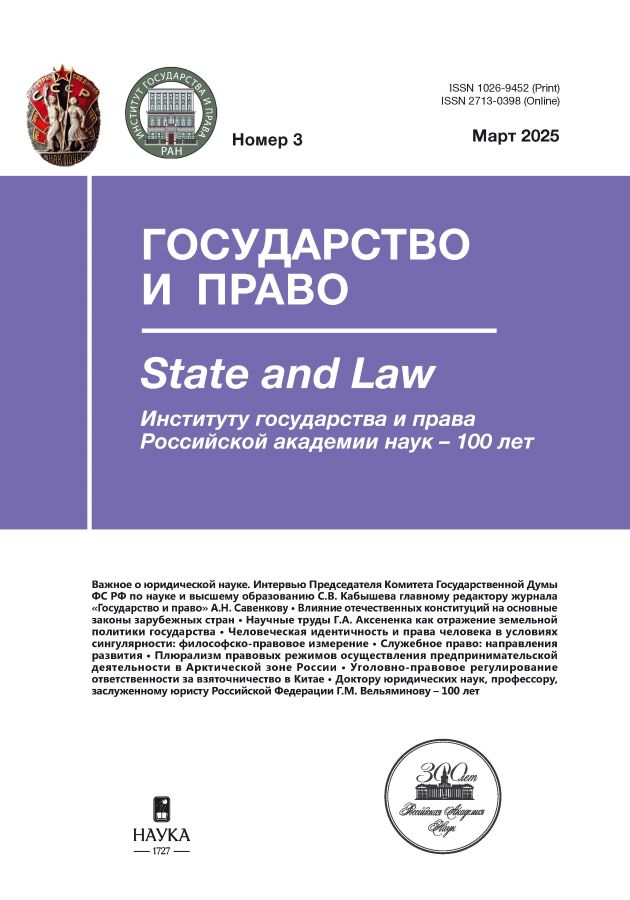Absenteeism and electoral protest: different understandings in scientific constitutionalism and other social sciences
- Authors: Bobrova N.A.1
-
Affiliations:
- Togliatti State University
- Issue: No 3 (2025)
- Pages: 68–75
- Section: Constitutional law of Russia
- URL: https://filvestnik.nvsu.ru/1026-9452/article/view/683018
- DOI: https://doi.org/10.31857/S1026945225030065
- ID: 683018
Cite item
Abstract
The purpose of the article is to streamline the categorical apparatus of the science of Electoral Law as a part of the science of Constitutional Law (scientific constitutionalism).
For the first time, the article draws attention to the different understanding of the categories of absenteeism, protest (political and electoral), as well as the legitimacy of the winning candidate by lawyers and representatives of other social sciences. Lawyers define absenteeism as non-participation in elections (from the word “absent”), and sociologists and political scientists as a form of political participation. In scientific constitutionalism, in addition to absenteeism, there is a broader category of electoral protest, which includes agitation against participation in elections and participation in various forms of protest.
Lawyers and representatives of other humanities have different understandings of the legitimacy of the candidate who won the election. For a lawyer, any winner is legitimate, regardless of the percentage of votes received, unless proven otherwise in court. Representatives of other sciences tend to measure the legitimacy of the winner in terms of the percentage of votes.
The role of the Constitutional Court of the Russian Federation and electoral technologies in the evolution of protest voting in Russia is considered. The author proves the need to return the line “against all” and the turnout threshold in the elections, which would guarantee civilized forms of electoral protest.
Full Text
About the authors
Natalya A. Bobrova
Togliatti State University
Author for correspondence.
Email: bobrovana@mail.ru
Doctor of Law, Professor, Honored Lawyer of the Russian Federation, Deputy of the Samara Provincial Duma, Professor of the Department of Constitutional and Administrative Law
Russian Federation, 14 Belorusskaya str., 445020 TolyattiReferences
- Avakyan S. A. Democracy of protest relations: constitutional and legal dimension // Constitutional and Municipal Law. 2012. No. 1 (in Russ.).
- Avakyan S. A. Constitutional theory and practice of public power: patterns and deviations // Constitutional and Municipal Law. 2015. No. 10. P. 7 (in Russ.).
- Avdeev D. A. Modern problems of the activities of public authorities in the light of their legitimacy // State and Law. 2021. No. 7. P. 39 (in Russ.).
- Bobrova D. N. Social factors of managing the behavior of young voters in regional elections: dis. … Candidate of Social Sciences. SPb., 2016. P. 7 (in Russ.).
- Bobrova N. A. Once again about the constitutional value of active suffrage // Constitutional and Municipal Law. 2024. No. 5 (in Russ.).
- Bobrova N. A. The reasons for the legalization of electoral offenses in court decisions // Constitutional and Municipal Law. 2015. No. 5. Pp. 62–66 (in Russ.).
- Bondar N. S., Dzhagaryan A. A. The constitutional value of the electoral rights of Russian citizens. M., 2005. Pp. 16–19, 166–168, 177, 178 (in Russ.).
- Velichinskaya Yu. N. Constitutional and legal guarantees for the expression of protest public opinion: some issues of institutionalization of protest voting // Constitutional and Municipal Law. 2016. No. 2. P. 43 (in Russ.).
- Viskulova V. V. Voting “against all”: it cannot be excluded (in the light of the decisions of the Constitutional Court of the Russian Federation) // Constitutional and Municipal Law. 2008. No. 5. Pp. 28–30 (in Russ.).
- Dedov D. I. The quality of institutions of Constitutional Law // Constitutional and Municipal Law. 2023. No. 10. Pp. 10, 17 (in Russ.).
- Zulyar R. Yu., Grigoriev D. A. Political absenteeism of youth: protest voting as overcoming factor (on the example of the election of the governor of the Irkutsk region in 2015) // Izvestiya Irkutsk State University. Ser.: Politologiya. Religious studies. 2016. P. 58 (in Russ.).
- Kolyushin E. I. On the quasi-implementation of decisions of the Constitutional Court of the Russian Federation // Constitutional and Municipal Law. 2011. No. 3. Pp. 55–60 (in Russ.).
- Kutafin O. E. There are harmless things, but there are cardinal ones // Lex russia. 2004. Vol. 63. No. 2. P. 77 (in Russ.).
- Malashenko I. V., Khabotko N. A. The problem of absenteeism in the modern youth environment and strategies for improving the quality of electoral behavior // Almanac of Modern Science and Education. 2016. No. 12 (114). P. 61 (in Russ.).
- Mitin G. N. Problems of the influence of violations of electoral legislation on the legitimacy of elections // Constitutional and Municipal Law. 2023. No. 12. Pp. 50, 51, 53 (in Russ.).
- Ospanov T. A., Abrakhmanov D. V. The “Against all” column in the context of political competition // Constitutional and Municipal Law. 2014. No. 6. Pp. 29, 30 (in Russ.).
- Riekkinen M. A. Constructive protest in Constitutional Law: an idealized myth or a potential reality? // Lex russica. 2014. No. 5 (in Russ.).
- Samarkina I. V., Logunova V. P. Youth absenteeism as a form of political participation // Society: politics, economics, law. 2017. No. 2. P. 37 (in Russ.).
- Troitskaya A. A. The right to protest: a clash with reality // Comparative Constitutional Review. 2012. No. 5 (90) (in Russ.).
- Sheverdyaev S. N. On some general aspects of the development of Russian Constitutional Law in the context of the actualization of the topic of political protest // Constitutional and Municipal Law. 2013. No. 7 (in Russ.).
Supplementary files










